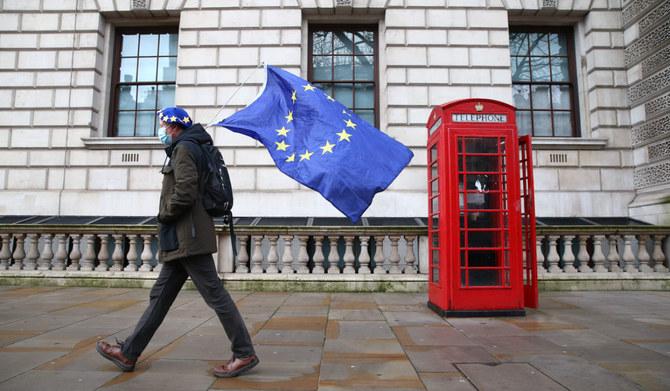
Sitting in his 18th-century farmhouse in the uplands of Bethlehem, in the breathtaking western reaches of the Brecon Beacons, Ian Rickman ponders the damage Brexit has done to his future. Two years since the UK quit the EU, the future for mountain sheep-farmers such as him is full of economic precarity.
He has lost unfettered access to his nearest export market, faces reduction in farm subsidies as the result of the loss of the common agricultural policy (CAP), and has been disadvantaged by trade deals giving access to the UK market to rival farmers from Australia and New Zealand.
“From a sheep farmer’s point of view, there’s no good outcome from those trade deals,” says Rickman.
“Their predominant international markets are China and the far east. Why give them access to the UK? At the moment we are fine, but if for some reason there were, God forbid, a Ukrainian-type situation in the far east and sanctions imposed overnight, they will use the huge access to our market,” he says.
It is a subject that jangles the nerves of farmers across Wales who see Brexit as all downside.
“A great deal is something more beneficial to agriculture. At the moment we haven’t, we’re only seeing the negative,” says Rickman. “There’s no way you can dress those trade deals up as a as a good thing. I’ve heard farmers say the industry was more or less chucked under a bus.”
Guto Bebb, the managing director of the Farmers’ Union of Wales (FUW), says his counterparts in Australia are very pleased with the contingency they now have if the Chinese market were to be closed off.
“But where’s our insurance policy after losing the single market? We don’t have one,” he says.
A study by the statutory levy body the Agriculture and Horticulture Development Board has concluded that New Zealand exports to the UK would rise by “about 13,000 tonnes (31%) if China imposed a 25% tariff on New Zealand lamb imports and 29,000 tonnes (69%) if there was an outright ban.”
Energy prices for everyone are going through the roof, while at the same time the cost of selling to the EU, which represents 33% of the lamb export market, has also spiralled.
A cross-industry veterinary and environmental health group, the Sanitary and Phytosanitary Certification Working Group, estimated that the new requirement for export health certificates, signed off by a vet, added £60m to the cost of food exports to Europe in 2021.
“It hasn’t been doomsday, but it is a question of more and more problems being added to trade,” says Bebb. “Brexit barriers are so unnecessary and for so little gain.”
Mountain sheep farming is a tough business, with many hill farmers unable to survive without subsidies, threatening not just livelihoods but the presence of a farmer as pastoral keeper of the land, which in Rickman’s case is part of one of Wales’s national parks.
Before returning to the subject of Brexit, Rickman talks of the importance of sheep grazing the uplands to keep grasses down and minimising the risk of climate change wildfires with tinder dry detritus building up.
Sitting in his kitchen, Rickman explains how his farming sector has been cushioned from the worst of Brexit as inflation has driven up the price of red meat.
Figures for 2020-21 show income from cattle and sheep farming in “less favoured areas” up 32% to £29,900. In other years it has been dangerously low – in 2017, the president of the FUW said it had dipped to £13,000, less than half the national average wage.
Brexit, the government said, was about giving farmers “for the first time in 50 years [the] chance to do things differently”.
George Eustice, then the environment secretary, asserted in 2020 that “it makes no sense to subsidise land ownership and tenure where the largest subsidy payments too often go to the wealthiest landowners”.
Among the beneficiaries of CAP direct payments, which were made per hectare, were the Brexiter James Dyson, who received more than £5m from the EU, and the former Daily Mail editor Paul Dacre, who pocketed £88,000 for his Scottish Langwell estate in one year alone.
But the National Farmers’ Union (NFU) and the FUW fear for the small farmers who are dependent on the CAP. MPs on the Welsh affairs committee expressed concern in 2022 “that around a fifth of Welsh farms had a farm business income of less than zero” with an average income of £26,000 per farm. Government research shows that the subsidy is the difference between profit and loss for 42% of farms in the UK.
Launched in 1962 as a partnership between agriculture and society, the CAP was envisaged as an income support scheme after research showed farmers’ income was 40% lower than non-agricultural incomes.
“I don’t get government support [EU subsidy] and then squirrel it away in my Swiss bank account or go off to Barbados. That doesn’t happen. That money goes straight out to the local businesses,” says Rickman, referring the vet, the mechanic, the feed supplier and the fence contractor. “Farming is the backbone of the rural economy.”
Agriculture is a devolved competency and as Wales is still designing the replacement for the CAP, farmers such as Rickman are still getting direct payments.
But Wales has accused Westminster of a political sleight of hand when carving up the amounts across the four nations of the UK.
The FUW has calculated Wales will be £225m down over the life of the current parliament on the basis that it had not yet used up all of the EU funding.
“It is political games. We take the view that the Westminster government is guilty of breaching a manifesto promise that it would match spending pound for pound,” says Bebb.
“Just because some of the money has not been spent does not mean it has not been allocated to a project. We’ve had a bypass near me open recently that was funded by the EU in 2020. You are allowed overhangs if projects take time to get up and running and completed,” he adds.
In Scotland, there is a similar gripe. The country reckons it will lose out on approximately £93m between 2021-25.
A Department for Environment, Food and Rural Affairs (Defra) spokesperson said: “The 2019 manifesto commitment maintains the annual farming budget of £2.4bn until 2024-25, with all reductions from farmers’ direct payments being reinvested back into the sector.”
They added that the CAP “did nothing to improve food production or food security and gave half the budget to the largest 10% of landowners”. The replacement scheme would “support the choices” and incentivise better farming, they said.
In England, the phasing out of the CAP is well under way with a new environmental land management scheme (ELMs) that will prioritise better practices in farming and environmental protection with financial incentives for moves such as reduction in fertiliser use or the maintenance of moorlands.
Defra figures show that the phasing out of the CAP is already affecting farm incomes even though the replacement scheme is still sketchy.
The progressive phasing out of the CAP has left farmers at least 20% down this year and they will be short by 50% of the previous EU subsidy in 2024.
“Farmers in England are now receiving less support, quite significantly less, so that will impact incomes,” says Nick von Westenholz, the director of trade and business strategy at the NFU.
“Most farmers still don’t know what it is that they’ll be signing up to in future years, or what they’ll have to do to meet the requirements of any new scheme,” he adds.
Under the plan in England, direct payments will be phased out completely by 2028. In its places, under ELMs, is a countryside stewardship scheme and the sustainable farming incentive (SFI) scheme.
Defra says about 32,000 farmers have already signed up to the countryside stewardship scheme, up 90% since Brexit was signed off in 2020.
The SFI scheme is still being piloted with new details to be announced in January.
Farmers have expressed concern that the administration and resource needed to participate in the scheme reduce its attractiveness.
“If the payments don’t make business sense, you will find farmers won’t sign up to the scheme,” says Von Westenholz.
For the NFU, which was vocal about the need to maintain trade and animal welfare standards, Brexit is still causing uncertainty for farm businesses six years after the referendum.
“Brexit was always going to lead to considerable change for farm businesses in the UK, with the end of free movement of labour and the CAP and a restructuring of our trading relationship with the EU and the rest of the world. But more than six years on from the referendum there is still massive uncertainty as to what that change actually looks like,” says Von Westenholz.
And while trade deals with big agricultural exporterssuch as Australia and New Zealand have been struck, thus increasing competition in the domestic market, “associated plans for increasing our exports and improving competitiveness appear to still be in the development phase”, he says, “while at the same time trade in agricultural products with our nearest neighbours in Europe has reduced dramatically”.
“None of this is inevitable, but it does need political will, compromise and long-term planning to resolve,” says Von Westenholz.
Regarding claims that British farming was being put at risk by trade deals, a Defra spokesperson said the “interests of our farmers and food producers is a priority of our trade policy and our trade deals are delivering on this. Our negotiations will continue to support farmers.”
In December, the environment secretary, Thérèsa Coffey, promised that the next batch of SFI payments, to be unveiled in the new year, would be easier and more beneficial to farmers.
She pledged to have the “full range” of replacement supports in place by 2024, which would work whether “you are a commoner, upland farmer, or small family farm”.












